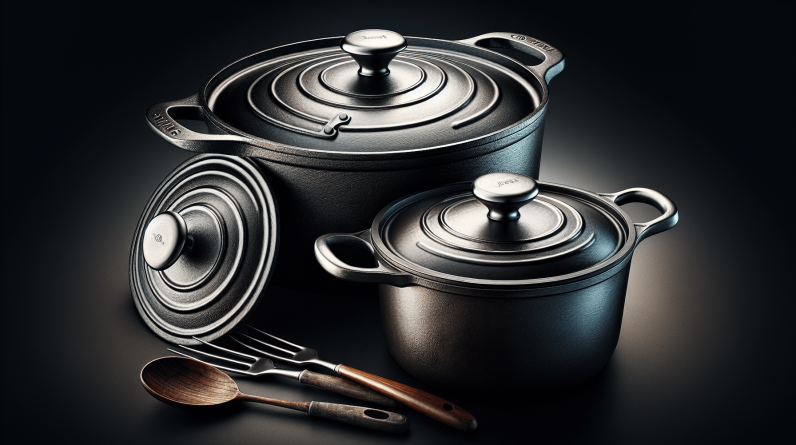Are you thinking about upgrading your kitchen appliances and wondering whether to choose a gas or electric cooktop? Well, fear not, because we have the perfect article for you. In this informative piece, we explore the pros and cons of gas versus electric cooktops, helping you make an informed decision that suits your cooking style and preferences. From energy efficiency to heat control, we cover all the important factors so you can confidently choose the perfect cooktop for your culinary adventures. So, let’s dive right in and discover the wonderful world of gas and electric cooktops!

Heat Source
When it comes to choosing a cooktop, one of the first decisions you need to make is whether you prefer a gas or electric heat source. Both options have their own advantages and disadvantages.
Gas Cooktops
Gas cooktops are known for their instant heat and precise temperature control. With a gas cooktop, you have the ability to adjust the flame quickly and accurately, giving you more control over your cooking. This is particularly beneficial for delicate dishes that require precise temperature adjustments.
Another advantage of gas cooktops is that they provide a visual indicator of the heat level. You can easily see the size and intensity of the flame, allowing you to gauge the heat without relying solely on temperature settings.
However, a potential downside of gas cooktops is the need for a gas line. If your kitchen doesn’t have a gas line already, installation costs can be higher and require professional assistance. Additionally, gas cooktops may have a steeper learning curve for those who are not accustomed to cooking with gas.
Electric Cooktops
Electric cooktops, on the other hand, offer a different set of advantages. One of the main benefits of electric cooktops is their consistent and even heat distribution. The heating elements on electric cooktops are typically flat and provide a more uniform heat across the entire cooking surface.
Electric cooktops also tend to heat up more slowly than gas cooktops, which can be an advantage for some dishes that require slower and gradual heating.
One potential drawback of electric cooktops is their slower response time. It may take some time for the heat to adjust after a setting is changed, which can make it challenging to achieve precise temperature control.
Cooking Performance
When it comes to cooking performance, both gas and electric cooktops have their strengths and weaknesses.
Gas Cooktops
Gas cooktops are often preferred by professional chefs and culinary enthusiasts due to their ability to quickly and accurately adjust heat levels. The direct flame heat source allows for excellent heat distribution and fast response times, making it easier to achieve the desired results in your cooking.
Gas cooktops are also well-suited for techniques that require high heat, such as searing or stir-frying. The intense and consistent heat provided by gas cooktops can help achieve the desired caramelization and browning in dishes.
However, gas cooktops may not be as ideal for low-heat cooking or simmering. The open flame can be more difficult to control at low temperatures, leading to potential challenges in maintaining a gentle simmer.
Electric Cooktops
Electric cooktops excel in their ability to provide consistent and even heat distribution. The flat and smooth surface allows for better contact between the cooking vessel and the heating element, resulting in more uniform cooking.
Electric cooktops are well-suited for dishes that require even heat, such as making sauces or melting chocolate. The steady and controlled heat provided by electric cooktops can help prevent scorching and ensure precise cooking results.
However, some cooking techniques may be more challenging on electric cooktops. For example, achieving a quick sear or adjusting heat levels rapidly may not be as effortless as with a gas cooktop. The slower response time of electric cooktops can sometimes require a bit more patience and planning in certain cooking scenarios.

Heat Responsiveness
The heat responsiveness of a cooktop refers to how quickly and accurately it can adjust and maintain heat levels.
Gas Cooktops
Gas cooktops are known for their excellent heat responsiveness. With a gas flame, you can quickly increase or decrease the heat intensity by adjusting the flame size or gas flow. This quick response time allows for more precise control over cooking temperatures.
The instant heat provided by gas cooktops is particularly beneficial for techniques that require immediate changes in heat, such as searing or sautéing. The ability to immediately adjust the heat intensity can help prevent overcooking or undercooking ingredients.
Electric Cooktops
Electric cooktops, while not as quick in heat responsiveness as gas cooktops, still offer reliable temperature control. The heating elements on electric cooktops typically take a bit longer to reach the desired temperature, but they are generally able to maintain the set heat consistently.
Electric cooktops are designed to distribute heat evenly across the cooking surface, which can help avoid hot spots and ensure even cooking. While the response time may be slightly slower, electric cooktops can still provide accurate and steady heat for most cooking tasks.
Control and Precision
Control and precision in cooking are essential for achieving consistent and high-quality results. Both gas and electric cooktops offer their own level of control and precision.
Gas Cooktops
Gas cooktops are renowned for their ability to provide precise control over heat levels. The instant heat adjustments offered by gas flames allow for fine-tuning of temperatures, which is especially beneficial for dishes with specific heat requirements.
The visual indication of the flame size and intensity also aids in control. With a quick glance, you can easily assess the heat output and make necessary adjustments to maintain the desired temperature.
Electric Cooktops
Electric cooktops, while not as instantaneous in heat adjustments as gas cooktops, can still offer precise control. Most electric cooktops feature digital controls that allow you to select specific heat settings, providing a level of accuracy in temperature control.
Additionally, the even distribution of heat across the cooking surface helps ensure consistent cooking results. The ability to precisely set and maintain a desired temperature can be advantageous for recipes that require precise heat levels.

Installation and Cost
When considering a new cooktop, it’s important to factor in the installation process and associated costs.
Gas Cooktops
Gas cooktops require a gas line installation in your kitchen. If your kitchen does not already have a gas line, this can significantly impact the installation process and associated costs. Professional assistance is typically needed to install the gas line and connect the cooktop.
Additionally, gas cooktops may require venting to expel any gas byproducts, such as carbon monoxide, from the cooking area. The need for proper ventilation can add to the installation complexity and cost.
Electric Cooktops
Electric cooktops, on the other hand, have a simpler installation process. As most homes already have electrical outlets in the kitchen, connecting an electric cooktop usually involves plugging it into an existing outlet or hardwiring it directly.
However, it’s essential to consider the electrical requirements of the cooktop to ensure compatibility with your kitchen’s electrical system. Some electric cooktops may require higher voltage or dedicated circuits, which may require modifications to your electrical setup.
In terms of cost, gas cooktops can be more expensive upfront due to the need for a gas line installation. However, gas is generally cheaper per unit of energy compared to electricity, which can result in lower operating costs in the long run.
Electric cooktops are typically more affordable in terms of upfront costs, but the cost of electricity can be higher, depending on your location and energy rates. It is essential to consider both the installation and operating costs when making a decision.
Energy Efficiency
Energy efficiency is an important aspect to consider for both environmental and cost-saving reasons.
Gas Cooktops
Gas cooktops are generally considered more energy-efficient than electric cooktops. The direct flame heat source allows for more efficient heat transfer, resulting in quicker cooking times and lower energy consumption.
Gas cooktops offer precise control over heat levels, which means you can quickly adjust the flame size to match the cooking needs, minimizing energy waste. However, the exact energy efficiency of a gas cooktop may vary depending on the model and the user’s cooking habits.
Electric Cooktops
Electric cooktops are known for their even heat distribution and steady cooking temperatures. However, they may not be as energy-efficient as gas cooktops.
Electricity conversion and transmission can lead to some energy loss, resulting in reduced overall energy efficiency. Electric cooktops also tend to take longer to heat up and cool down, which can contribute to higher energy consumption.
Some electric cooktops offer features such as induction cooking, which uses magnetic fields to directly heat the cookware. Induction cooktops can be more energy-efficient compared to traditional electric cooktops, as they provide quicker and more precise heat transfer.

Maintenance and Cleaning
Cooktop maintenance and cleaning are necessary to keep your appliance in good condition and ensure optimal performance.
Gas Cooktops
Gas cooktops are generally easier to clean compared to electric cooktops. The removal of grates and burner caps allows for access to the burners, making it easier to clean spills and food debris.
However, it’s important to ensure that the gas burners are completely dry before reassembling them to prevent any potential issues with gas flow.
Periodic cleaning of the gas cooktop’s grates and burners is recommended to remove any built-up grease or residue. Regular care and proper cleaning can help prolong the lifespan and efficiency of the gas cooktop.
Electric Cooktops
Cleaning an electric cooktop can be a bit more challenging due to the smooth and flat surface. Spills and food debris can easily get stuck and baked onto the cooking surface, requiring more effort to remove.
However, most electric cooktops come with ceramic or glass surfaces that are easy to wipe clean with a damp cloth. It is important to use non-abrasive cleaning materials and gentle cleaning agents to avoid scratches or damage to the surface.
Some electric cooktops may come with removable coils or heating elements, which can simplify the cleaning process. These components can be easily lifted out for more thorough cleaning, and it’s important to ensure they are completely dry before reinserting them.
Regular maintenance and cleaning of electric cooktops are essential to prevent any buildup of burnt-on residue and to maintain the appliance’s performance.
Safety
Cooktop safety is a crucial consideration, particularly if you have young children or pets in the household.
Gas Cooktops
Gas cooktops pose some safety considerations due to the use of an open flame as the heat source. It is important to ensure proper ventilation during gas cooktop use to prevent the buildup of gas byproducts, such as carbon monoxide.
The flame and gas supply should be closely monitored to prevent accidental fires or gas leaks. Proper installation and regular maintenance of gas lines and connections are essential for safe operation.
Gas cooktops often come with safety features such as flame failure detection, which automatically shuts off the gas supply if the flame is extinguished. Additionally, some gas cooktops feature a lockout function that prevents accidental activation or changes to the settings.
Electric Cooktops
Electric cooktops are generally considered safer in terms of fire hazards, as they do not rely on an open flame. The absence of a flame reduces the risk of accidental fires and gas leaks.
However, electric cooktops can still pose burn risks due to the heated cooking surfaces. It’s important to exercise caution while cooking and to use appropriate cookware with flat and stable bottoms to prevent tipping or spills.
Some electric cooktops come with safety features such as residual heat indicators, which alert you when the surface is still hot after use. This can help prevent accidental burns and provide an extra layer of safety.

Environmental Impact
Environmental impact is an important consideration in today’s world. Both gas and electric cooktops have their own environmental implications.
Gas Cooktops
The environmental impact of gas cooktops primarily depends on the source of gas used. Natural gas, which is commonly used in residential settings, is a fossil fuel. The extraction and combustion of natural gas produce greenhouse gas emissions, contributing to climate change.
However, natural gas is generally considered a cleaner-burning fuel compared to other fossil fuels, such as coal or oil. Modern gas cooktops with efficient burners can help reduce energy waste and minimize carbon emissions.
Electric Cooktops
Electric cooktops rely on electricity, which can have varying environmental impacts depending on the source of the electricity. If the electricity comes from fossil fuel-based power plants, it can contribute to greenhouse gas emissions and air pollution.
However, the increasing use of renewable energy sources, such as solar or wind, can significantly reduce the environmental impact of electric cooktops. Utilizing green energy options can make electric cooktops a more environmentally friendly choice.
Preference and Style
Ultimately, the choice between gas and electric cooktops often comes down to personal preference and style.
Gas Cooktops
Gas cooktops have a timeless appeal and are often favored by those who enjoy the visual element of cooking. The dancing flames and immediate heat provide a traditional and authentic cooking experience.
For individuals who appreciate the control and precision offered by gas cooktops, this option may be more appealing. The ability to adjust the flame size and temperature manually can provide a sense of mastery in the kitchen.
Gas cooktops also offer a broader variety of cookware compatibility, as the open flame can work effectively with a wide range of materials.
Electric Cooktops
Electric cooktops offer a sleek and modern look that can seamlessly blend into contemporary kitchen designs. The smooth and glass-ceramic surfaces provide a minimalist aesthetic that appeals to many homeowners.
For those who prioritize ease of cleaning and maintenance, electric cooktops may be a preferable choice. The lack of burner components and the flat surface make it easier to wipe clean and maintain a tidy appearance.
Electric cooktops are also generally considered safer in terms of fire hazards, making them a suitable option for households with young children or safety concerns.
In the end, the choice between gas and electric cooktops greatly depends on personal preference, cooking style, and the specific needs and limitations of your kitchen space.
Both options have their own advantages and disadvantages, so it’s essential to consider factors such as heat source, cooking performance, heat responsiveness, control and precision, installation and cost, energy efficiency, maintenance and cleaning, safety, environmental impact, and personal preference and style when making your decision. Happy cooking!










